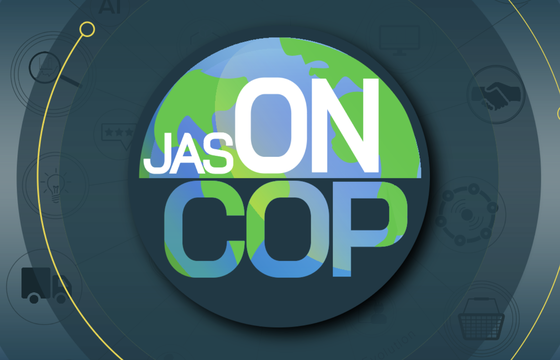
As COP28 kicks off today, our resident COP expert and Managing Director of Global Retail, Jason Murphy has shared his thoughts on the anticipated topics and themes of this years United Nations Climate Change Conference.
Today marks a significant juncture as the annual United Nations COP climate conference kicks off and we commemorate the one-year anniversary of the IMS podcast series, JasON COP27. In this insightful series, I spoke to a host of expert guests about the key 2022 themes across five episodes. The JasON COP27 finale encapsulated a review of the conference, spotlighting achievements such as the finance packages for developing nations and the commitment to urgent actions on critical issues like food security and waste reduction.
Now, a year on, join me in reflecting on the milestones of COP27 and exploring how these have developed over the last 12 months, and envisioning the path ahead for COP28, where almost 200 countries will gather in Dubai to agree on the next global steps in tackling the climate crisis.
How can COP28 build on achievements of COP27?
To determine the goals of COP28, we first have to reflect on the takeaways of COP27:
1. Urgent action is required:
At COP27, it was clear there was a pressing need for deep, rapid, and sustained reductions in global greenhouse gas emissions. The conference determined that this would require rapid transformation of every industry. I suspect the same message of increased urgency will also be prominent at this year's COP28, following multiple climate-driven crises over the last 12 months.
2. Financial matters took centre stage:
One of the headline outcomes was organisers reaching an agreement to compensate nations for loss and damage caused by climate change through the establishment of a fund. There have been dozens of contentious meetings held in the year since the loss-and-damage fund was established to negotiate who would contribute to it, how large it would be, who would administer it, and more. A draft agreement was reached just a few weeks before this year’s COP28, which will be up for final approval at the upcoming climate talks.
3. Eight billion people to feed:
During COP27, the global population surpassed the eight billion mark, drawing attention to ongoing issues, such as food security and food waste. During the conference, The Food and Agriculture for Sustainable Transformation Initiative (FAST) was launched by the Egyptian presidency and the United Nations Food and Agriculture Organization (FAO), aiming to facilitate the financing of projects to decarbonise and boost the resilience of agricultural sectors in the most vulnerable communities.
COP28: Whats new?
COP28 will be the first to have a day dedicated to health, and the first to host a health and climate ministerial, which will include explorations of how food systems can be transformed and how food security can be increased. Furthermore, for the first time the FAO will outline how food systems must change for the world to reach its net zero targets. This focus should be welcomed, as the food industry has a significant role to play in achieving the goals established at COP27 and COP28.
Currently, about 17 percent of all food grown is lost or wasted and food system emissions were estimated at 18 billion tonnes in 2021. As a result, clear advice and guidance is needed for waste and emissions to be reduced, and retailers and supply chain organisations will be looking for leadership from the conference around how to build resilience, improve the quality and availability of food and reduce the environmental impacts of the food industry.
Why now?
The global projection indicates a staggering one-third increase in food wastage by 2023 meaning that, during the coming months and years it is paramount that concrete action is taken to reduce the amount of food being wasted across the supply chain. Noteworthy strides are already underway in this pivotal transition; for instance, Aldi has pledged to reduce its food waste by 20% by 2025 and halve it by 2030, and Tesco, has linked executive bonuses to slashing food waste.
Furthermore, the resources and technology available offer a compelling opportunity for supply chain organisations and retailers to adopt and embrace practices that mitigate waste, protect food quality, and improve shelf-life, whilst driving proven optimisations and reductions in energy consumption and carbon footprint. Technological advancements, fuelled in part by ambitious climate goals set by governments and conferences such as COP28, have laid the groundwork. Yet, the journey toward effective utilisation of innovation to tackle pressing climate issues requires additional guidance and regulation.
With the need so prominent and solutions available, this is the time for a spotlight to be shone on the industry and global guidance to be provided. I look forward to what COP28 will bring to the table!